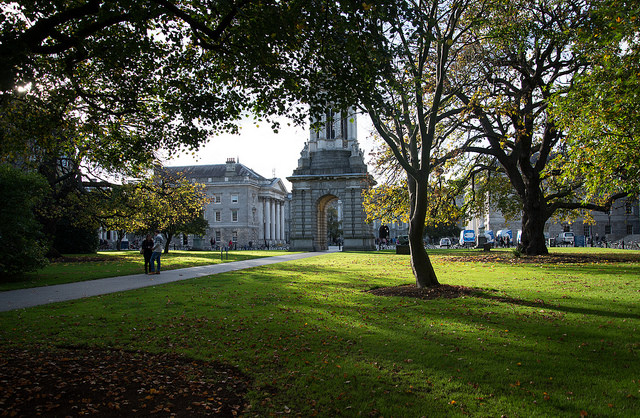Trinity spent €550,000 on legal fees in 2016, over €300,000 more than in 2015, The University Times has learned, as the number of legal firms used by Trinity has swollen in the last several years.
From spending €44,000 between September and December in 2014, the legal fees paid by Trinity have jumped significantly to over €556,000. Between January and July 2017 alone, the College has already spent €223,000 between five different Dublin-based law firms.
The figures are all contained in a freedom of information request submitted by The University Times.
Over the years, Trinity has paid out the most to Arthur Cox, one of Ireland’s top law firms. Between September 2014 and July 2017, using the premier firm has cost Trinity nearly €700,000.
Between 2015 and 2016, Trinity’s spending increased significantly, rising from €236,000 to nearly €560,000. There are few trends on what the money is spent on, with costs roughly evenly split between litigation and corporate costs. Last year was something of an exceptional year, with Trinity spending €385,000 on corporate services and €171,000 on litigation.
The University Times has also obtained the fees paid by Trinity to defend the now well known case of former lecturer David Parris, who sued Trinity for discrimination based on age and sexuality. The legal costs for the case, which made national headlines, reached nearly €60,000. The case has seen national politicians, such as University of Dublin Senators Ivana Bacik and David Norris, coming to Parris’s aid, offering support and promises of legislative reform.
Parris, a lecturer in the Department of French, retired in 2010 after working in Trinity for nearly 40 years. Trinity’s current pension scheme contains what is often referred to as a “gold-digger clause”, which requires that a person must be married to their spouse before the age of 60 in order for the spouse to receive pension benefits.
In his submission to the European Court of Justice, Parris had argued that such a clause discriminated against him on account of his age and sexuality because, under Irish law, Parris was unable to enter into civil partnership or marriage with his partner until after his 60th birthday. This was too late to allow Parris’s partner to qualify for pension payments from Trinity.
The court rejected this argument, arguing that since the pension regulations did not discriminate against people over age or sexuality, it could not be discriminatory when age and sexuality were combined.
While the issue is one being played out in an Irish context, the legal points behind Parris’s case have been at the centre of a number of European cases in recent years. Indeed, Parris’s case was expected to succeed in the European Court of Justice after a sympathetic report from the court’s advocate general.
But so far, his case has had little success in both the Labour Court and the European Court of Justice, where Trinity fought the case alongside the Higher Education Authority (HEA) and the pensions company, Mercer.
However, a bill introduced by Bacik in the Seanad attracted considerable cross-party support, with work ongoing with the government to create a proposal that would change the law in favour of couples like Parris and his partner.

Speaking to The University Times, Parris said he expected his costs to be much higher. For a case in the European Court of Justice, the legal fee paid by Trinity is remarkably small. However, when combined with the fees the HEA and Mercer must have paid, the Trinity figure seems more reasonable.
“It does leave us in the weird situation that the courts, the government in the form of the HEA and Trinity as a public body, are opposing these measures. While just up the road in the Oireachtas, the government is putting through reforms to enact them”, he said.
The reforms are moving slowly, but if a bill passed guaranteeing Parris’s partner a pension, it would be something of a pyrrhic victory: “I will succeed in getting for free what I failed to get by paying for it.”
Irish universities have come under increased scrutiny for their spending in recent months. The Oireachtas Public Accounts Committee has not been afraid to rebuke universities and colleges it sees as wasting public monies, although Trinity has so far escaped the brunt of criticism.
However, university autonomy is an increasingly pressing issue and universities are accountable for the public money they spend. In an email statement to The University Times, the College Solicitor Sinéad Mac Bride explained the figures as resulting from an increase in projects that required expert legal advice.
“During 2016 a number of capital projects and strategic initiatives required expert external legal advice such as the Trinity Business School, the student residency development and an increase in commercial activities. These projects are ongoing and will continue beyond 2017”, she said.
Given that costs for this year have already risen well beyond €200,000, it is unlikely that such high legal fees will decline in the near future. This year, over €171,000 has already been spent on legal advice from Arthur Cox and nearly €22,000 was spent on advice from Matheson.
With the Business School not scheduled to be completed until 2019, and with work beginning on Oisín House after a lengthy planning battle from the College, it is perhaps unsurprising that more expert legal advice might be needed in the future.
All fees, Mac Bride said, are the result of a public procurement process. Many of the firms Trinity has worked with in the past, such as Beauchamps and McCann Fitzgerald, came from a tendering process, with the companies offering advice in a range of areas, including estate management, education and intellectual property.
The document provided to The University Times shows the cache of large Irish firms Trinity has been routinely employing over the last couple of years. As the complexity of the issues Trinity has had to address has increased, the cost of legal fees has risen, with Trinity becoming an increasingly lucrative customer to Ireland’s most prominent law firms.







